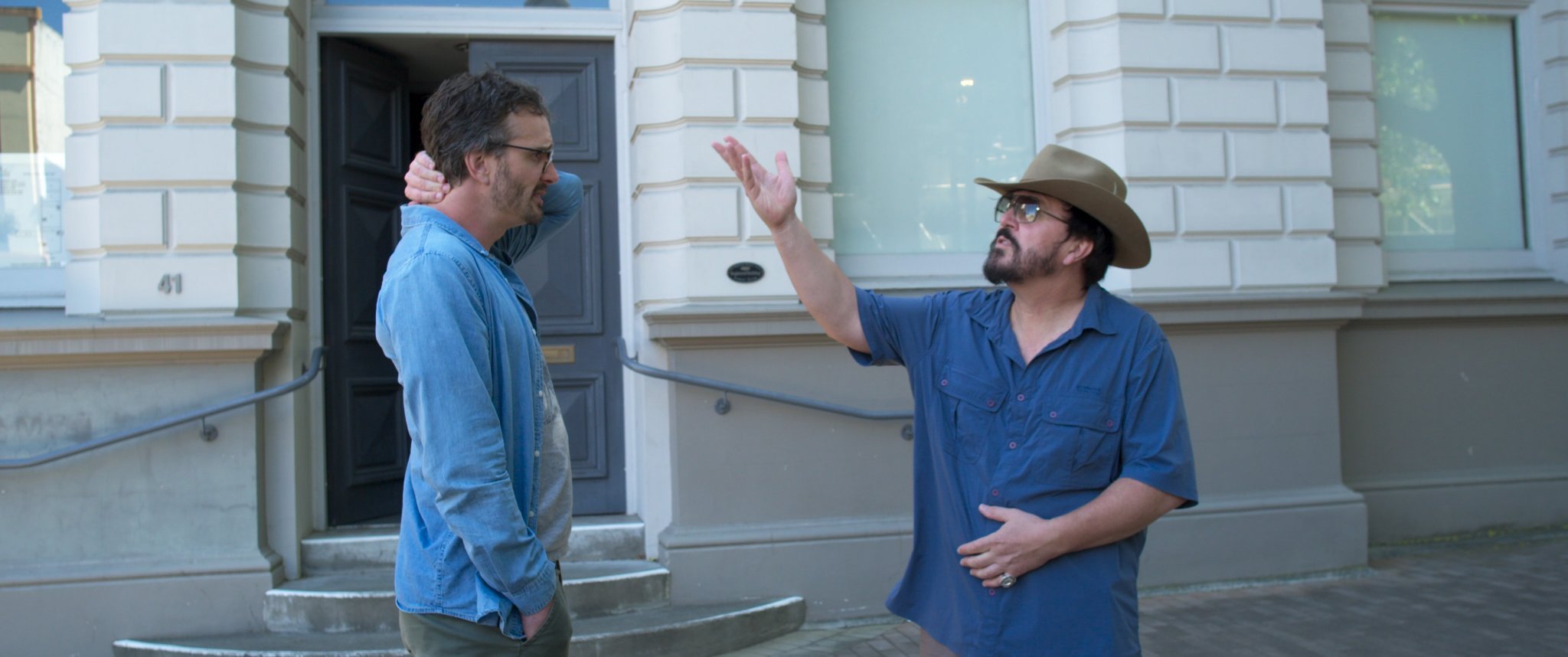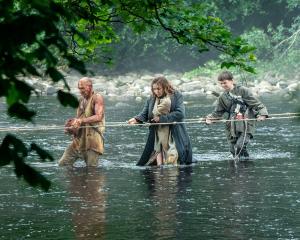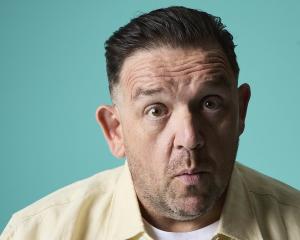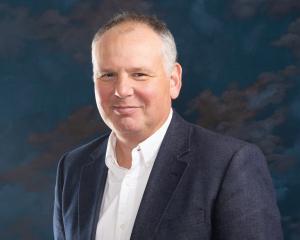
It’s a small film, David Farrier says. But don’t be fooled into thinking you’ll be able to watch it and just as quickly leave it behind with the popcorn crumbs.
It’ll likely get in your head like it got into Farrier’s. A nightmare-length visit by someone you hoped never to meet, a beating around the temples with a four by two length of banality.
Mr Organ, Farrier’s new documentary, is about Michael Organ, a man depicted as a study in malevolent, predatory self-absorption, a practised manipulator preying on people at the margins, leaving a trail of hollowed-out victims.
Here’s the film-maker himself, in a snippet from the film’s voice-over: "Spending time with Michael is a paradox. On one hand it is intriguing and fascinating but at the same time his stories are so complex and impenetrable I feel like I am getting a lobotomy ... Michael Organ is a black hole and I have fallen in."
Following immediately on this insight, we see Farrier, apparently alone though probably sharing the room with the film crew, speaking distressed into a phone.
"I don’t know what to do with him. He’s like a void," Farrier says into the phone, and attempts a desperate half laugh.
He feels trapped, he says.
"And it’s, like, I’ve kind of f***** up ... I feel like I f***** up in pitching the film in the first place because it is so ... like, it is so obvious there is nothing there. It’s, like, he’s a f****** who bores people to death until they, like, jump off a building."
So, that was clearly a production low point. And yet, after a couple of film festival screenings in the United States, Farrier is feeling a lot better about his film’s prospects.
"I had a fairly unpleasant time making it, so I wasn’t particularly looking forward to having to think about it again," he says on the phone from the US. "But we’ve been at a couple of festivals in the States and Stephen Fry came along to one of them and he seemed to enjoy it, so that sort of reaction has had me slightly less apprehensive about the whole situation."
Indeed, the British polymath tweeted this to his several million followers:
"I’ve just emerged blinking and trembling from MISTER ORGAN and couldn’t recommend a film more highly. If you want proof that fact is stranger than fiction — wow! Congratulations @davidfarrier — another fabulous achievement ..."
The "another" could be referencing Farrier’s 2016 documentary Tickled, a dive into the world of "competitive endurance tickling", though as Guardian journalist Elle Hunt wrote, "not really about that at all". Or his series Dark Tourist, in which he travels to places associated with death and/or suffering — including drug cartel capital Medellin, where he spent time with Pablo Escobar’s former hit man, Popeye.
"I’ve made a career out of looking at the weird and bizarre side of life," Farrier conceded in the trailer for Tickled.
But just as Tickled wasn’t really about "competitive endurance tickling" at all, neither is the rest of Farrier’s work just about the weird and bizarre; it can’t be dismissed as passingly diverting reality-lite click-bait.
He polishes these oddballs up to such a high sheen we can see ourselves.
Farrier first became interested in Organ when he popped up in Auckland charging exorbitant sums to release the cars of unsuspecting motorists who’d made the mistake of parking in a private car park owned by an associate. He’d clamped their wheels.
Stories about the clamping, by Farrier and others, led to a change in New Zealand’s laws governing the activity and how much can be charged to release a vehicle.
"I get very curious about people who are being mysterious and I feel a certain sense of journalistic justice in wanting to ... that old idea of shining sunlight into dark corners and sunlight being the best disinfectant and all that stuff," he says down the phone line. "And I just saw someone who had been getting away with a lot of different things, and when I realised it was more of a psychological story, how he was engaging with other people and it extended much beyond the clamping, that’s when I got really determined to see what the f*** was going on."
So, while others moved on after the clamping headlines had faded, Farrier remained locked on, having become fascinated by Organ’s apparently will-o’-the-wisp existence. And indeed Organ, in Farrier’s telling, occupies a world of rooms, buildings and locations from a screenwriter’s imagination, while reciting an improvised script, part Mike Leigh and part David Lynch, after Beckett.
In the end, the documentary took more than four years to make and has left Farrier in a kind of self-imposed exile in the US, largely due to a desire to put some physical distance between himself and the subject of the film.
It’s also left him with a pretty bleak view of humanity, he says, not helped by the stories he’s been writing more recently about allegations of abuse inside New Zealand mega-church Arise.
"Humans if left to their own devices, a great portion of them will treat other people pretty badly. And, yeah, it gives me a pretty negative view of people," he says.
"I think it is an interesting time we are living in, particularly at the moment. Part of the time we were editing this film in New Zealand, Donald Trump was president, and we would often talk in the edit about how it is a really good time to be alive, to be successful, if you pick a lie, you pick a reality that is not real and stick with it, be really pig-headed about it, and just keep repeating it, and keep repeating your truth, and life will go pretty well for you. You will become president of the United States or you will have a lot of money, you will have the life you want. At the expense of others, of course, but we are kind of living in this time ... the time to shine if you are a piece of s*** is now, and that’s something I keep coming back to."
Online platforms only make it easier.
Asked whether Mr Organ addresses that phenomenon specifically, Farrier sidles up to the question carefully.
"This is a small film. It is about a very specific story. It is small. Even Tickled was a small story but it had this weird global element to it. This is a very New Zealand story. But I like to think that the behaviours in it, people can expand out beyond the story in the film and apply it to characters in their own lives or people they have met or ways of behaviour that they see and understand that and maybe catch it a little bit sooner as opposed to just accepting reality as it is in front of them. Maybe be a bit more sceptical or trust your gut more if you feel that someone is maybe manipulating you, don’t let politeness get in the way of it. If you feel that, then follow your gut."
Farrier says he met a woman following a US festival screening of Mr Organ who was crying because she’d lost three years of her life to a relationship with all the same hallmarks.
"It was quite powerful for her watching this, because she had felt like she was in this unique situation and she had let herself get into this situation with an horrific partner and watching Mr Organ, this film made in a country she’s never been to, about people she’s never met, she suddenly saw her own reality reflected, a reality she’d escaped but she still felt very alone in. And I think just seeing this made her feel seen and less alone, and that is the dream reaction I would want someone to take away from something like this."
That reaction, for Farrier, also answers the potential objection that making a film about Organ just played into his hands, vaulting him into celebrity.
The important thing about the film is that it allows the victims to tell their stories and see each other, Farrier says.
"Until now they have all been in isolation, they haven’t known about each other. They have had their lives derailed in a confusing, odd way. Whether it was for a week or for decades. And they don’t really know why."











